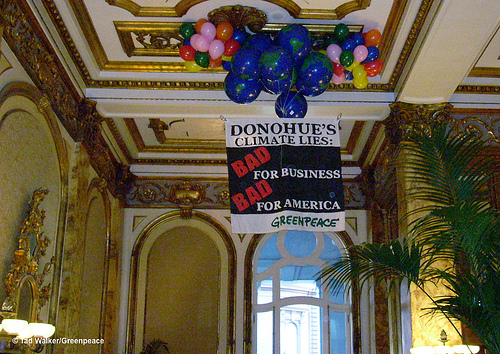See update below.
The US Chamber of Commerce, which has been busy this year fighting everything from climate change legislation to health care reform to financial regulation, has taken on a new battle: It’s come out against congressional measures intended to curb the spread of the H1NI virus, which has sickened 22 million Americans since April and killed an estimated 3,900 people.
The bills, introduced in the Senate by Christopher Dodd (D-Conn.) and in the House by Reps. Rosa DeLauro (D-Conn.) and George Miller (D-Calif.), would provide American workers with five days of paid sick leave. The provision would sunset after two years, but the idea is to keep swine flu carrying workers from infecting their collleagues and adding to the epidemic.
Chamber Vice President Randel K. Johnson told the New York Times that they oppose paid sick leave because “the vast majority of employers provide paid leave of some sort.” Except, many employers don’t–one third of workers don’t have any paid sick leave. Less than half of service-sector employees have paid sick leave, and only 39 percent of construction and farming workers get leave. Low-wage workers are the least likely to have paid sick leave, and the most likely to come to work sick because they need the money.
Yet the lack of paid sick leave is causing many people to go to work while ill, despite admonitions to stay home. This is a particular concern for service-sector employees, like waiters, child care providers, and health care workers who interact with the public as part of their job and can easily transmit the virus to others.
The Chamber insists that a global epidemic is not a good reason to start treating employees like human beings all of a sudden. “The problem is not nearly as great as some people say,” said Johnson. “Lots of employers work these things out on an ad hoc basis with their employees.”
The Service Employees International Union is now circulating a petition against the Chamber, asking them to “cease lobbying” against the measure.
UPDATE: Over on the Chamber’s blog, the group argues that they have not formally opposed this legislation in particular, and believes that SEIU is attacking them unfairly.
“[T]he U.S. Chamber recognizes that this issue has many dimensions and is exploring whether legislation in this area would be helpful to employees without overburdening employers and limiting their options to provide benefits tailored to their workplace,” they wrote.













